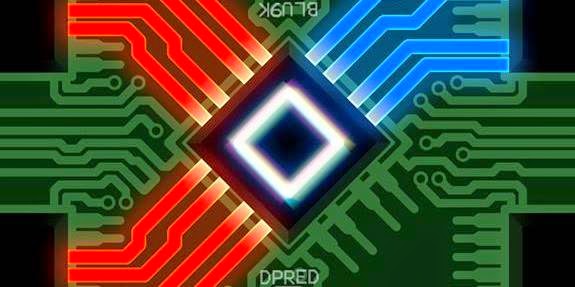
The aim of resistor is to hack your opponent’s main frame by creating an unbroken line of your colour from your mainframe to the enemy’s. If you do so you knock the enemy’s mainframe down a DefCon level and you get closer to launching a nuclear missile, but you can ignore the whole cold war aspect as its largely irrelevant. You achieve all this by taking three actions each turn in any order; swap a card out, flip a card over and draw and discard a card. These three actions may not sound like much but they are really clever for one reason; the cards are double sided and you have to hold your hand so your opponent can see the opposite side of the card.
So let’s spell this out for you, there are seven cards on the table, two in your hand and two in your opponent’s. Each card has two sides, meaning two different routing options. That’s 11 different cards leading to 22 different options to consider and remember. Now you may have an eidetic memory and if so then congratulations you've won this game before we started. I, however, do not have an eidetic memory and would probably forget my own name if it wasn't sewn into all of my clothes. Trying to remember where more than 3 cards are at a time is a struggle for me, managing all 22 combinations is nigh on impossible. So this means you’re constantly trying to manipulate the cards to create the path you do know, while at the same time your opponent is moving them all around again as soon as you've finished. To say the game is a brain burner is an understatement.
When you do finally make a match and score the game doesn't reset, suddenly you’re on the offence and your opponent’s turn becomes an effort to remove the key pieces to prevent you from battering down his door again. And that’s where resistors come in.
Hacking the enemy isn't the only way of scoring; connecting a mainframe to a resistor will also cause a change in DefCon. This has a knock on effect in that a resistor also removes cards from the row. Each time a resistor hits play it is removed table and not replaced, thereby reducing the number of cards by one. At first this seems counter intuitive; many games increase their complexity as the game progresses, almost as a nod to say, “Well done, aren't you clever”. But removing the resistors makes things easier, you've got fewer cards to remember and so have a better chance of remembering which card is where.
It give you more chances to get the pattern you need but also means each action has a greater effect on the overall board. Suddenly you feel more in control and more confident but so does your opponent. The result is a cranking up of the tension. Rather than a game that adjusts to your skill level, creating an even flow of game play, RESISTOR_ is the game equivalent of a crescendo. As the game progresses the chance of making a winning move increases but the penalty of a mistake becomes much greater.
For such a simple concept RESISTOR_ is a beautiful looking game. Each card looks like a real printed circuit board and there are lots of little touches that take it above and beyond a normal game. My favourite is the box becomes integral to the game as it hides the contents of the cards while in play while at the same time is made to look like an old fashioned video game cartridge that slots into the main box. There’s also a little audio jack on the box, it does nothing but its a little detail that made me smile.
I really can’t sing RESISTOR_’s praise too highly. It’s a beautiful looking game, and probably the best Kickstarter prototype I have ever received. It’s easy to learn and teach but takes some real cerebral processing to be good at. There’s a risk of the old analysis paralysis as you weigh up your options but you’re not juggling hundreds of resources and effects like a heavy euro. In fact, RESISTOR_ is a very quick game to play, and its build up of momentum means that it can be over very quick. I'm struggling to say anything bad about RESISTOR_. Oh here’s one, the QR code on the side of the box is difficult to scan.
This Kickstarter preview is based on a prototype version of the game provided by the publisher; the
final product may look, play or smell different to that used in this
preview.











.png)







0 comments:
Post a Comment